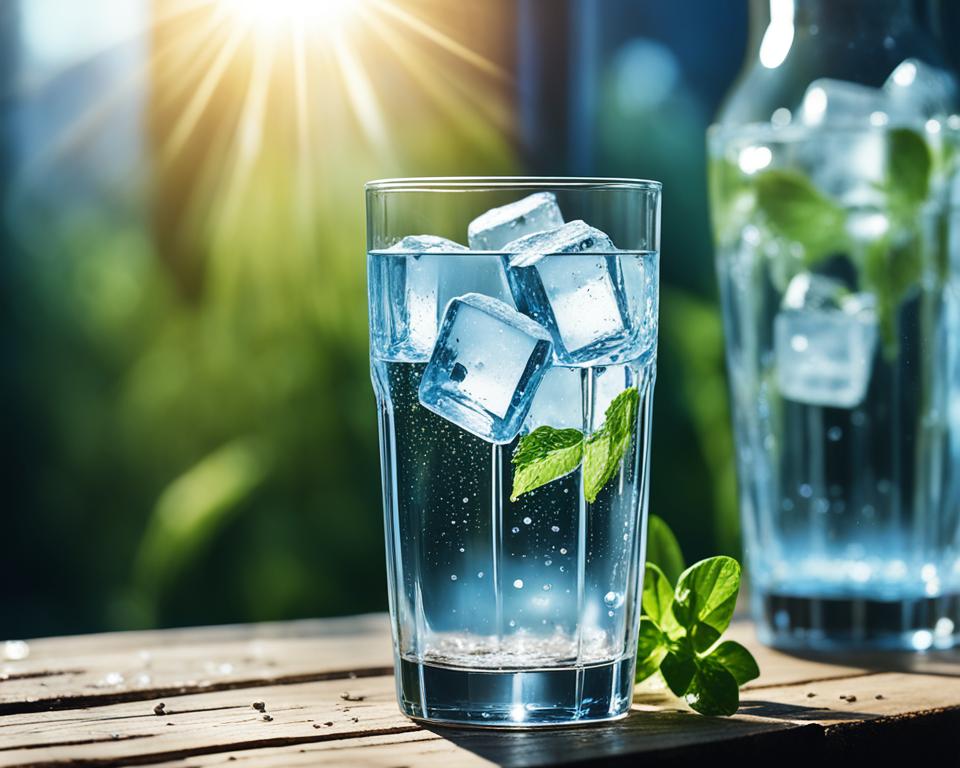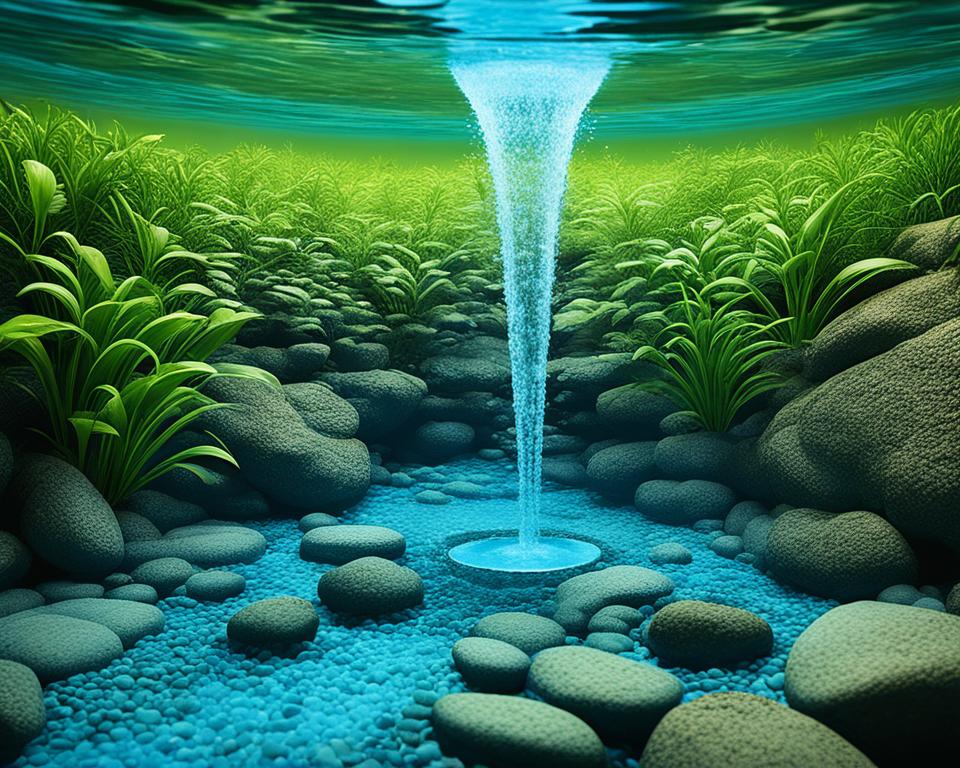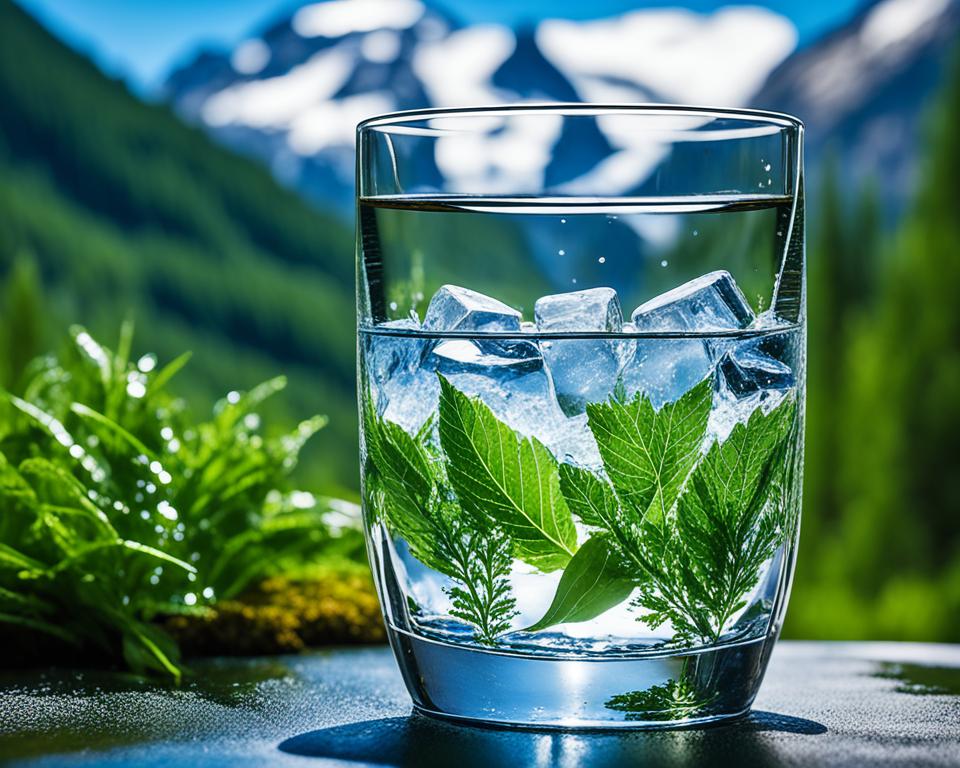In today’s world, picking the right drinking water is key for staying healthy and feeling good. There are many choices, like purified and mineral-rich spring water. This guide will help you pick the best water for your daily routine.
We’ll look at the special qualities and possible benefits of different waters. This includes purified, alkaline, spring, mineral, filtered, reverse osmosis, artesian, and distilled water. By learning about each type, you can choose the water that fits your health goals and lifestyle.
Read more interesting information at ::lansdowne-moody
Understanding the Importance of Drinking Water
Drinking enough water is key to staying healthy. It helps with many bodily functions. This makes it a must-have for a healthy life.
Hydration and Overall Health
Drinking enough water keeps your body at the right temperature. It helps with digestion and moves nutrients and oxygen around. Not drinking enough water can make you feel tired, give you headaches, and hurt your thinking skills.
The Role of Water in Bodily Functions
- Water is about 60% of our body weight. It keeps our fluids balanced.
- It helps our important organs like the kidneys and liver work right. They get rid of waste and toxins.
- Water keeps our joints moving smoothly, our skin healthy, and our heart and lungs working well.
Drinking enough water every day is good for your health. Knowing why drinking water is important helps you keep your body hydrated. This way, your body gets the fluids it needs to stay healthy.
| Benefits of Proper Hydration | Consequences of Dehydration |
|---|---|
| Regulates body temperature | Fatigue and decreased energy levels |
| Aids digestion and nutrient absorption | Headaches and dizziness |
| Supports joint and skin health | Impaired cognitive function |
| Promotes cardiovascular and respiratory function | Increased risk of kidney stones and urinary tract infections |
The Different Types of Drinking Water
Choosing the right type of drinking water is key to staying hydrated and healthy. There are many options, each with its own benefits. Let’s explore the different types of water you can drink.
Purified water is a popular choice. It goes through strict cleaning to remove all impurities. This makes it a great choice for those who want clean water.
Alkaline water has a higher pH level. Some think it helps with hydration and balances body acidity. But, the science on its benefits is still out.
Spring water comes from underground sources and is known for its purity. It may have minerals that are good for you. But, make sure it’s from a safe source.
Mineral water has minerals that are good for your health. It tastes refreshing and is considered healthy.
There are more options like filtered water, reverse osmosis water, artesian water, and distilled water. Each has its own benefits. Knowing the differences can help you choose the right one for you.
By learning about the different types of water, you can pick the best one for you. This choice supports your health and well-being.
Purified Water: A Safe and Reliable Choice
Purified water is a top choice for drinking water. It goes through strict cleaning steps to remove harmful stuff. This makes it very clean and safe to drink.
Methods like reverse osmosis and distillation are used to clean the water. Reverse osmosis filters out heavy metals and germs. Distillation heats the water to make it pure.
Purification Methods and Quality Standards
Purified water uses different ways to clean it. Reverse osmosis filters out many impurities. Distillation uses heat to make water pure.
There are strict rules for purified water quality. These rules set limits on harmful substances. This means purified water is always safe to drink.
| Purification Method | Key Benefits |
|---|---|
| Reverse Osmosis | Removes a wide range of impurities, including heavy metals, minerals, and microorganisms. |
| Distillation | Utilizes heat to vaporize water, leaving behind contaminants and delivering a pure, crystal-clear result. |
Knowing about water purification helps people choose the best purified water. This way, they can be sure their drinking water is safe and reliable.
Alkaline Water: Potential Benefits and Drawbacks
Alkaline water is getting a lot of attention for its health benefits. It has a higher pH level than regular water, between 8 to 9.5. People say it can improve health, but experts are still discussing the facts.
Potential Health Benefits of Alkaline Water
- Improved Hydration: Alkaline water might be easier for the body to absorb. This could mean better hydration.
- Neutralizing Acidity: Its high pH level could balance out the body’s acidity. This might lead to better health.
- Antioxidant Properties: Alkaline water might fight off harmful free radicals. This could support overall health.
Potential Drawbacks of Alkaline Water
- Lack of Conclusive Evidence: Some studies hint at benefits, but experts aren’t sure about alkaline water’s health effects.
- Potential Gastrointestinal Issues: Drinking too much alkaline water might upset your stomach, causing bloating or nausea.
- Mineral Imbalances: Drinking it too often could throw off your body’s mineral balance. This might lead to health problems.
| Potential Benefits | Potential Drawbacks |
|---|---|
| Improved Hydration | Lack of Conclusive Evidence |
| Neutralizing Acidity | Potential Gastrointestinal Issues |
| Antioxidant Properties | Mineral Imbalances |
Alkaline water’s benefits are interesting, but we should look at both sides. Before adding it to your routine, talk to a doctor. They can help decide if it’s right for you, considering your health and medical history.
“The debate around the health benefits of alkaline water continues, with proponents touting its advantages and critics questioning the scientific evidence.”
Spring Water: Nature’s Gift or Potential Risks?
More people are looking for natural water sources, like spring water, because they want to stay healthy. Spring water is known for being pure and full of minerals. But, we need to look closer at where it comes from and how it’s regulated to see its good and bad sides.
Sourcing and Regulation of Spring Water
Spring water comes straight from underground aquifers, filtered by rock and soil. This makes it rich in minerals like calcium, magnesium, and potassium. But, there are worries about the quality because there’s not much control over how it’s collected and sold.
- Spring water doesn’t face the same tough tests and treatments as city water, thanks to the Environmental Protection Agency (EPA).
- Rules for spring water vary a lot by state, with some being stricter than others.
- Bad handling of spring water can bring in harmful germs, chemicals, or other bad stuff, which is a health risk.
To make sure spring water is safe and clean, it’s important to check out the brand or supplier. Look for ones that follow strict rules and are open about their process. This way, you can trust that you’re getting a good, healthy drink.
“The quality of spring water can vary greatly depending on the source and the way it is collected and handled. Consumers must be diligent in understanding the origin and processing of any spring water they choose to drink.”
Knowing about where spring water comes from and how it’s regulated helps us make smart choices. This way, we can pick a water that fits our health and safety needs.
Mineral Water: A Refreshing and Nutrient-Rich Option
Mineral water is a top choice for staying hydrated. It’s full of essential minerals like calcium, magnesium, and potassium. These minerals are great for your health and make mineral water a top pick for quenching thirst.
Mineral water helps refill your body’s mineral stores. These minerals are key for strong bones, good heart health, and muscles that work well. Drinking mineral water daily can boost your health and make you feel better overall.
| Mineral | Potential Health Benefits |
|---|---|
| Calcium | Supports bone health and muscle function |
| Magnesium | Helps regulate blood pressure and nerve function |
| Potassium | Maintains fluid balance and supports heart health |
Mineral water tastes great and has a natural fizz. It’s perfect for those who want a unique and tasty way to stay hydrated. You can drink it alone or mix it with other drinks to make it even more interesting.
“Incorporating mineral water into your diet is a simple and effective way to ensure your body receives the essential nutrients it needs to thrive.”
When choosing mineral water, pay attention to where it comes from. Pick waters from natural springs or aquifers that don’t have added stuff. This way, you get to enjoy the best of mineral water and support your health at the same time.

Filtered Water: Removing Contaminants at Home
Filtered water is a top choice for those who want to keep their drinking water clean. Home water filters make it easy to get pure water right from your faucet. They are both handy and effective.
Types of Filtration Systems
There are many home water filters to pick from. Pitcher filters are a budget-friendly option that fits easily into your daily life. They use activated carbon to take out chlorine, dirt, and other unwanted stuff from your water.
Faucet-mounted filters are also popular. They sit on your kitchen sink and give you filtered water whenever you need it. These systems use a mix of filters, like carbon and ion exchange resins, to remove more kinds of contaminants.
For the whole house, you can get a system that filters all the water. These systems have different stages, like sediment, carbon, and reverse osmosis membranes. They make sure all the water in your home is clean and filtered.
| Filtration System | Key Features | Contaminants Removed |
|---|---|---|
| Pitcher Filters | Affordable, portable, easy to use | Chlorine, sediment, some organic compounds |
| Faucet-Mounted Filters | Convenient, filters water on demand | Chlorine, sediment, heavy metals, some organic compounds |
| Whole-House Filtration | Comprehensive, treats all household water | Sediment, chlorine, heavy metals, organic compounds, microorganisms |
No matter which home water filter you pick, the main aim is to make sure your drinking water is clean and safe.
Reverse Osmosis Water: Ultra-Pure and Crisp
Reverse osmosis has changed the game in drinking water, bringing a new level of purity and clarity. This process uses a semi-permeable membrane to filter out many contaminants. It removes dissolved salts, heavy metals, and even tiny living things, making the water taste fresh and clean.
This method pushes water through a special membrane under pressure. It leaves behind the bad stuff, like pollutants. Thanks to this, reverse osmosis water is known for being very clean, with up to 99% of pollutants removed.
| Contaminant | Removal Rate |
|---|---|
| Dissolved salts | Up to 99% |
| Heavy metals | Up to 99% |
| Microorganisms | Up to 99% |
| Organic compounds | Up to 99% |
The taste of reverse osmosis water is crisp and clean, thanks to its purity. It’s a top choice for anyone wanting the best water purification. Whether it’s for drinking more water daily or keeping your home or office water top-notch, reverse osmosis is a solid choice.
Reverse osmosis water is great for those who care about their health and their family’s well-being. By getting a reverse osmosis system, you can rest easy knowing your water is always clean and refreshing. Enjoy the confidence that comes with drinking pure water every time.
Artesian Water: A Unique and Naturally Filtered Source
Artesian water is a special choice among waters. It comes from deep underground aquifers. This water goes through layers of rock and soil, making it very pure.
This water is filtered naturally as it moves underground. It cleans itself by leaving behind dirt and harmful stuff. This natural filtration makes the water taste great and keeps good minerals in.
“Artesian water is a true testament to the power of nature’s own filtration system.”
Artesian water is always the same quality. It’s not affected by things like pollution or weather. So, you always get the same great taste and quality.
Looking into artesian water can be really interesting. It’s a great choice for those who want pure and tasty water. It’s good for your health and makes you feel better.

| Characteristic | Artesian Water | Other Water Sources |
|---|---|---|
| Filtration Process | Natural filtration through layers of rock and soil | Various purification methods, such as reverse osmosis or distillation |
| Mineral Content | Preserves beneficial minerals | May lose some essential minerals during processing |
| Consistency | Steady and reliable supply from underground aquifers | Can be affected by environmental factors and seasonal changes |
| Taste | Crisp, clean, and refreshing flavor | May have a varying taste profile depending on the treatment process |
Distilled Water: Purity at Its Finest
Distilled water is the top choice for clean drinking water. It goes through a detailed process to remove almost all contaminants. This leaves us with water that is clear, tasteless, and odorless. It’s known for its high purity.
Applications and Potential Health Concerns
Distilled water is used in many areas, like medical equipment, labs, steam irons, and car batteries. It’s also great for aquariums, keeping the water balanced for fish. But, its purity can cause health worries.
Distilled water doesn’t have the minerals our bodies need, like calcium and magnesium. Drinking it too much can lead to a lack of electrolytes and minerals. This can harm our health.
| Distilled Water | Regular Drinking Water |
|---|---|
| Lacks essential minerals | Contains beneficial minerals |
| May lead to mineral deficiencies | Helps maintain electrolyte balance |
| Used in medical and industrial applications | Primarily for drinking and household use |
So, it’s best to drink distilled water in small amounts. Add a balanced diet or mineral-rich water to get the right minerals. Knowing about distilled water helps us use it wisely in our daily lives.
“Distilled water is the purest form of water, but it’s important to remember that it lacks the essential minerals our bodies need.”
Healthiest Water to Drink: Balancing Quality and Accessibility
Finding the healthiest water to drink is not easy. It’s all about balancing quality, nutrients, and how easy it is to get. We need to think about what we need and like when choosing.
First, let’s talk about water quality. Purified water is a top choice because it’s clean and safe. Alkaline water might be good for health but can be hard to find and expensive. Spring water and mineral water have natural nutrients but can be tricky to pick because of their different sources and rules.
Then, there’s how easy it is to get the water. Filtered water and reverse osmosis water are easy to get at home but can cost a lot upfront. Artesian water and distilled water have special benefits but might not be easy to find everywhere.
“The healthiest water to drink is the one that strikes the right balance between quality, nutrition, and accessibility for your individual needs.”
So, picking the healthiest water is really about what fits your life, wallet, and health goals. Knowing the differences between each type helps you choose the best for you.
Choosing the Right Water for Your Lifestyle
Choosing the best drinking water is not one-size-fits-all. Your lifestyle, personal taste, and needs are key in picking the right water for you. Let’s look at the main things to think about when picking the best drinking water.
Factors to Consider
When picking drinking water, think about quality, taste, cost, and how it affects the planet. Knowing these water selection factors helps you make a choice that fits your life.
- Water Quality: Check how pure and safe the water is. Look for purified, filtered, or reverse osmosis water for the best quality.
- Taste Preferences: Some like the fresh taste of spring water, while others prefer the mineral-rich taste of alkaline or mineral water. Try different types to see what you like best.
- Cost and Accessibility: Think about the cost and how easy it is to get the water. Bottled water might be pricier, but filtered water at home can save money.
- Environmental Impact: If you care about the planet, consider how making and moving water affects the environment. Using reusable bottles or a home filter can cut down on plastic waste and your carbon footprint.
| Water Type | Water Quality | Taste | Cost | Environmental Impact |
|---|---|---|---|---|
| Purified Water | High | Neutral | Moderate | Low |
| Alkaline Water | High | Slightly Mineral-Rich | High | Moderate |
| Spring Water | High | Fresh and Crisp | Moderate | Moderate |
| Filtered Water | Moderate to High | Neutral to Slightly Improved | Low | Low |
Think about these factors to pick the drinking water that fits your lifestyle considerations and tastes. This way, you can stay hydrated in a healthy and eco-friendly way.
Conclusion: Embracing a Hydrated and Healthy Life
Drinking water is key to our health and well-being. The choices we make about water affect our bodies and lives deeply.
Now, we know the benefits of different water types. We can pick the best water for us, whether it’s purified, spring, or alkaline water. Each type has its own advantages.
Being hydrated means more than just drinking water. It means feeding our bodies, helping our functions, and living fully. By choosing the best water, we boost our health and energy. We can live a life full of vitality and potential.



